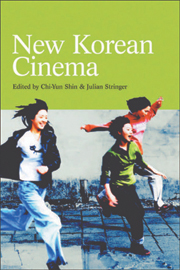Book contents
- Frontmatter
- Contents
- Notes on the Contributors
- List of Illustrations
- Introduction
- Part I Forging a New Cinema
- Part II Generic Transformations
- 6 Putting Korean Cinema in its Place: Genre Classifications and the Contexts of Reception
- 7 Horror as Critique in Tell Me Something and Sympathy for Mr.Vengeance
- 8 Two of a Kind: Gender and Friendship in Friend and Take Care of My Cat
- 9 ‘Just Because’: Comedy, Melodrama and Youth Violence in Attack the Gas Station
- 10 All at Sea? National History and Historiology in Soul's Protest and Phantom, the Submarine
- Part III Social Change and Civil Society
- Glossary of Key Terms
- Bibliography of Works on Korean Cinema
- Websites
- Index
7 - Horror as Critique in Tell Me Something and Sympathy for Mr.Vengeance
from Part II - Generic Transformations
Published online by Cambridge University Press: 05 August 2013
- Frontmatter
- Contents
- Notes on the Contributors
- List of Illustrations
- Introduction
- Part I Forging a New Cinema
- Part II Generic Transformations
- 6 Putting Korean Cinema in its Place: Genre Classifications and the Contexts of Reception
- 7 Horror as Critique in Tell Me Something and Sympathy for Mr.Vengeance
- 8 Two of a Kind: Gender and Friendship in Friend and Take Care of My Cat
- 9 ‘Just Because’: Comedy, Melodrama and Youth Violence in Attack the Gas Station
- 10 All at Sea? National History and Historiology in Soul's Protest and Phantom, the Submarine
- Part III Social Change and Civil Society
- Glossary of Key Terms
- Bibliography of Works on Korean Cinema
- Websites
- Index
Summary
What makes a horror film a horror film? That it evokes an overwhelming sense of terror and abjection in the viewer? That it compels us to watch the unwatchable and name the unnameable? If these definitions hold true, then director Chang Yun-hyŏn's Tell Me Something (T'elmissŏmding, 1999) and Pak Ch'anuk's Sympathy for Mr. Vengeance (Poksu-nŭn na-ŭi kŏt, 2002: hereafter Sympathy) are horror films through and through. Indeed, they perform the objectives of ‘scaring’ and ‘terrorising’ the audience with an almost excessive level of efficiency.
Even so, the marketing campaigns for both films scrupulously avoided the ‘horror’ label. In South Korea, Tell Me Something was confusingly marketed as a ‘hardcore thriller’. For the most part, however, the movie was mainly perceived by the audience and film reviewers as a star vehicle for Han Sŏk-kyu and Shim Ŭn-ha, and therefore not really worthy of serious critical analysis. On the other hand, Sympathy, stuck with an equally strange tagline, ‘authentic hardboiled movie’, was received favourably by many film critics, and was selected as the best Korean film of 2002 by Film 2.0 magazine, among other journals. It turned out, however, to be a box-office disappointment despite the casting of major stars Song Kang-ho, Bae Du-na and Shin Ha-kyun.
Even though horror films no longer constitute a marginalised genre, they are still sometimes considered distastefully misogynist, gratuitously violent or inherently conservative, in the sense that they seem to categorise the outsiders and the underprivileged (homosexuals, ethnic minorities, political critics, women) as ‘other’ or monstrous, and to punish with acts of graphic violence (in the case of the non-supernatural ‘slasher’ genre) those who are sexually active or unconventionally minded.
- Type
- Chapter
- Information
- New Korean Cinema , pp. 106 - 116Publisher: Edinburgh University PressPrint publication year: 2005

